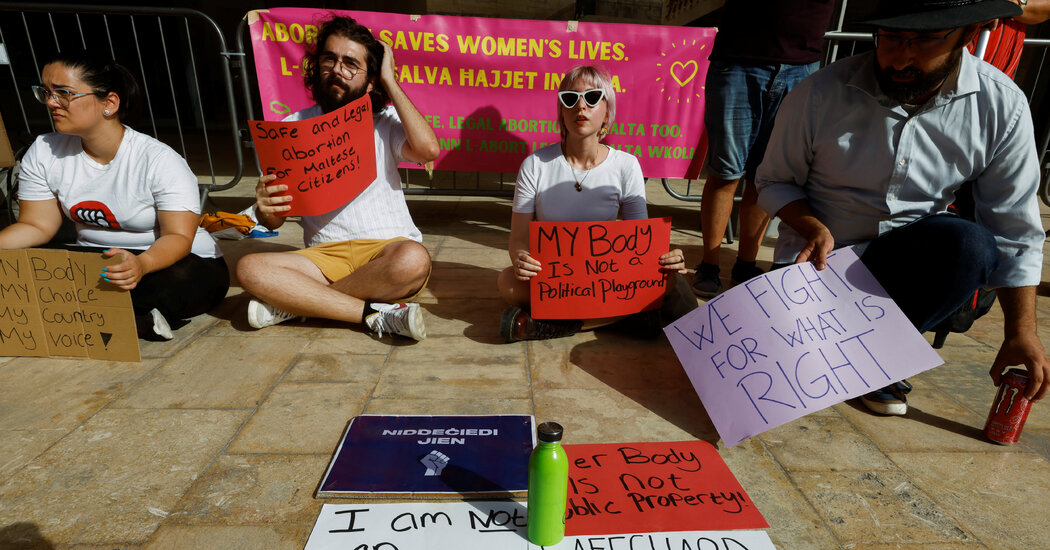
Andrea Prudente, a 38-year-old photographer who lives near Seattle, and her partner, Jay Weeldreyer, expected their trip to Malta to be a “babymoon” where they could connect with each other while enjoying the Mediterranean sun and local sights.
But a few days after they arrived in Malta on June 5, Ms. Prudente, then 16 weeks pregnant, began to miscarry. A few days later, her water broke and her placenta began to detach, making it impossible for the fetus to survive, according to Dr. Isabel Stabile, a gynecologist who has worked with Doctors for Choice, a Maltese advocacy group.
Ms. Prudente and Mr. Weeldreyer were devastated. But then they discovered that the situation was even worse than they had imagined, and that Ms. Prudente’s own life was also at risk.
A scan revealed that her cervix was open, and the umbilical cord was protruding, leaving her at risk of a fatal infection, as well as hemorrhage from the detaching placenta, Dr. Stabile said. The best way to protect Ms. Prudente from those potentially deadly complications would be for a doctor to remove the placenta and fetus from her uterus. Ms. Prudente called the midwives she had been seeing back home and they urged her to have that procedure immediately.
But she was soon confronted with a major obstacle: because the fetus’s heart had not yet stopped, the procedure would be illegal in Malta, where abortion is criminalized.
Unless she could find a way to leave the country, her only option would be to wait, potentially for weeks, for the fetus to die — and hope the pregnancy did not kill her in the meantime. But because of her fragile medical condition, a way out of Malta has been difficult to find.
She is now scheduled to fly to Spain on Thursday night, but in her condition, nothing is certain.
Ms. Prudente’s crisis was the latest in a series of incidents that have shown how abortion restrictions can leave women in deadly danger — and how travel to a more permissive jurisdiction can be difficult or impossible.
It is a danger that women already live with in Malta, Poland and other jurisdictions where all or nearly all abortions are banned. And it is one that some women may soon face in the United States if, as is widely expected, the Supreme Court overturns Roe v. Wade. Although state abortion bans would likely include exceptions for protecting the woman’s life, recent cases in other countries suggest that doctors often still refuse to perform abortions in such circumstances, fearing they could be prosecuted.
Mr. Weeldreyer and Ms. Prudente had no idea that abortion was illegal in Malta when they arrived at the hospital last Sunday. And no one there explained the legal restrictions to them, they said — only that their fetus would definitely not survive, and that Ms. Prudente was being admitted to the hospital for observation.
Read More on the U.S. Abortion Debate
Mr. Weeldreyer said the couple eventually understood that they could not even count on a surgical intervention if Ms. Prudente developed a life-threatening infection. He said that doctors told them that in that situation they would increase Ms. Prudente’s antibiotics in order to protect her without interfering with the fetus.
Deaths of other women after similar complications offer chilling evidence of how dangerous those sorts of plans can be.
In 2012, the ordeal of Savita Halappanavar, a young woman in Ireland, began very similarly to that of Ms. Prudente. Ms. Halappanavar’s amniotic sac ruptured prematurely, but the heart of the fetus inside her continued to beat. At the time, abortion was illegal in Ireland, so doctors refused to remove the fetus. Six days later, Ms. Halappanavar developed sepsis, went into cardiac arrest and died. Her case became a rallying cry for abortion rights activists, and helped spur a 2018 referendum that legalized abortion in Ireland.
The same grim sequence played out last year in Poland, where a 2020 legal decision removed nearly all exceptions to the country’s abortion ban, when a young woman named Izabela Sajbor was admitted to the hospital after her water broke at 22 weeks’ gestation. Doctors refused to remove the fetus while a heartbeat was detectable. By the time they did, Ms. Sajbor already had a severe infection. She, too, died.
As Ms. Prudente realized how much danger she was in, she and Mr. Weeldreyer began to panic.
At one point, she wondered if she should ask Mr. Weeldreyer to punch her in the stomach to hasten the end of the pregnancy.
From her hospital room, the couple searched frantically online, trying to find someone who could help. They eventually found Dr. Stabile, the gynecologist, and Lara Dimitrijevic, a women’s rights lawyer.
Both had the same advice: Leave Malta.
But a safe way out of the Mediterranean island nation proved hard to find. Ms. Prudente’s condition makes travel risky: If she were to hemorrhage, she could bleed to death in mid flight unless she received immediate medical intervention.
“You can’t just put her on a commercial flight to the nearest European capital,” Dr. Stabile said. “Nobody, including myself, would give her a fit to fly.” She cannot reach a more permissive jurisdiction unless she travels by an air ambulance that can give emergency care en route — but even that has posed major bureaucratic and logistical problems.
Her situation highlights a grim reality of abortion bans: Women may not be able to travel to other jurisdictions to terminate pregnancies when they urgently need to do so.
The State of Roe v. Wade
What is Roe v. Wade? Roe v. Wade is a landmark Supreme court decision that legalized abortion across the United States. The 7-2 ruling was announced on Jan. 22, 1973. Justice Harry A. Blackmun, a modest Midwestern Republican and a defender of the right to abortion, wrote the majority opinion.
Before Ms. Sajbor died in Poland, she had told a friend she was looking into having an abortion abroad after discovering that her fetus had severe abnormalities, including a dysfunctional heart chamber. But then her water broke, setting in motion the chain of events that led to her death.
That is the reality that some American women could also face if, as is widely expected, the Supreme Court overturns Roe v. Wade, allowing states to criminalize abortion. Although abortion is expected to remain legal in some states, women who encounter medical emergencies may lack the resources for interstate travel by ambulance, which is often prohibitively expensive.
In Malta, women generally have no means of escaping the island if they have medical complications like Ms. Prudente’s, Dr. Stabile said. Air ambulances cost thousands of dollars, and few residents have private medical insurance. “Of course the situation for Maltese women is much worse,” Dr. Stabile said. “The solution for this couple is having to travel. But for a local person it’s not a viable option.”
Ms. Prudente has private insurance that covers medical evacuations. But even that has not yet been enough to get her to safety.
The hospital in Malta initially took more than 24 hours to provide copies of her medical records needed to arrange the transfer, Mr. Weeldreyer said. And then, he said, he was told by the insurance company that the hospital had incorrectly said that Ms. Prudente had already left against medical advice, leading to a mistaken impression that she no longer needed evacuation, and causing further delays.
The hospital did not respond to a request for comment, and the insurer declined to comment.
IMG, her insurance company, initially hoped to evacuate her to London, only to abandon that plan when its medical team determined that the three-hour flight would be too risky, Mr. Weeldreyer said they were told by the IMG medical team.
Italy, Malta’s nearest neighbor, was ruled out because so many of its doctors refuse to perform abortions that they could not be confident she would get the care she would need.
On Wednesday, IMG called with a new plan: They would evacuate Ms. Prudente to a hospital in Mallorca, Spain. Though not as close as Italy, it was the nearest destination that they felt could provide reliable care.
IMG now hopes to evacuate her Thursday night.
And the clock is ticking. Ms. Prudente’s seven-day course of potent antibiotics started last Thursday. Every hour she waits adds to the risk of infection or other catastrophic complications, as well as to the psychological pain of being trapped in grief and fear.
“It feels like torture,” Ms. Prudente said. “Presuming I survive this,” she said, “I want this to change.”
“This is wrong, and it should not happen to anyone else.”




